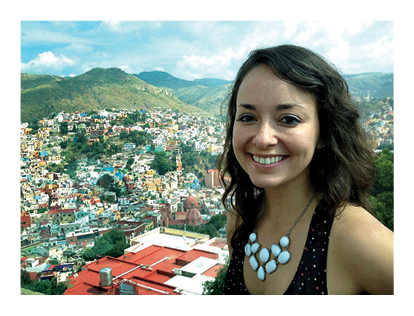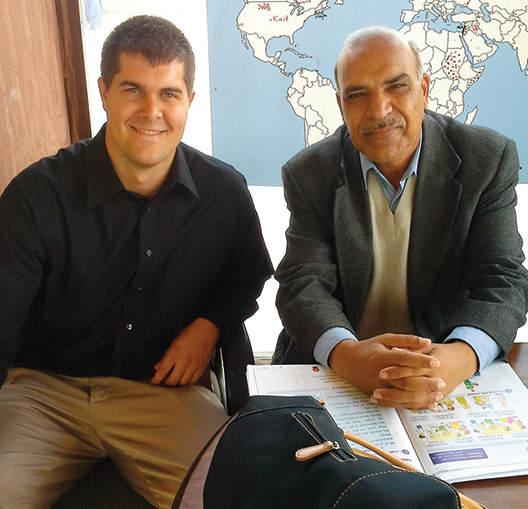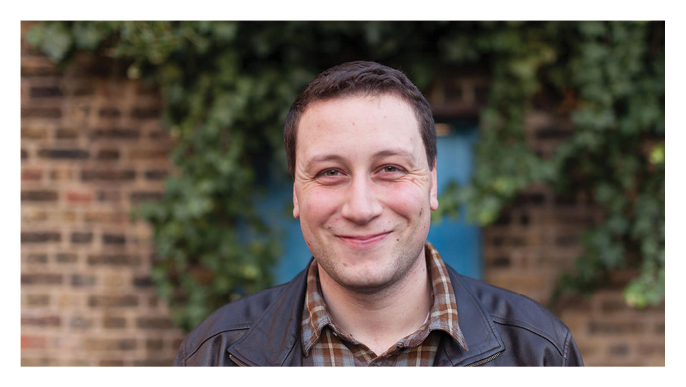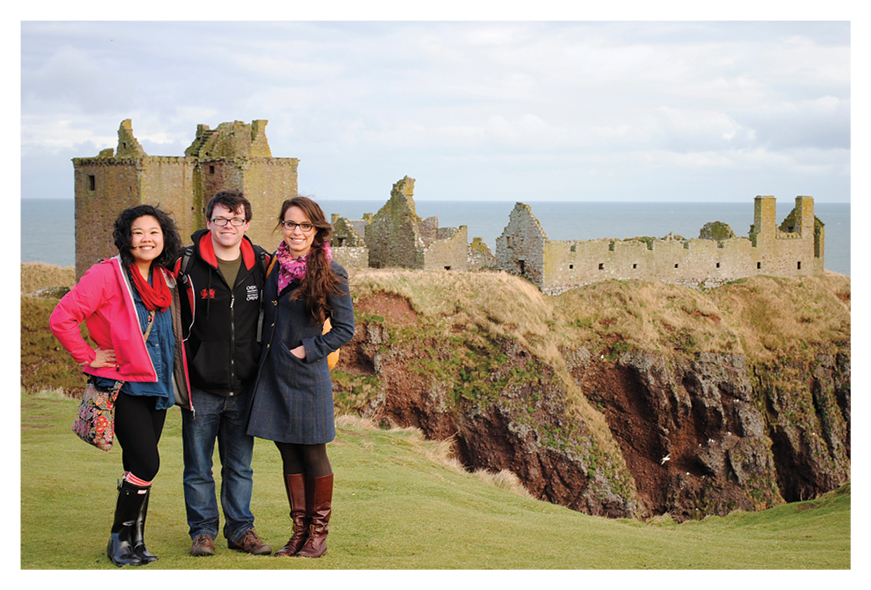Fulbright Briefs
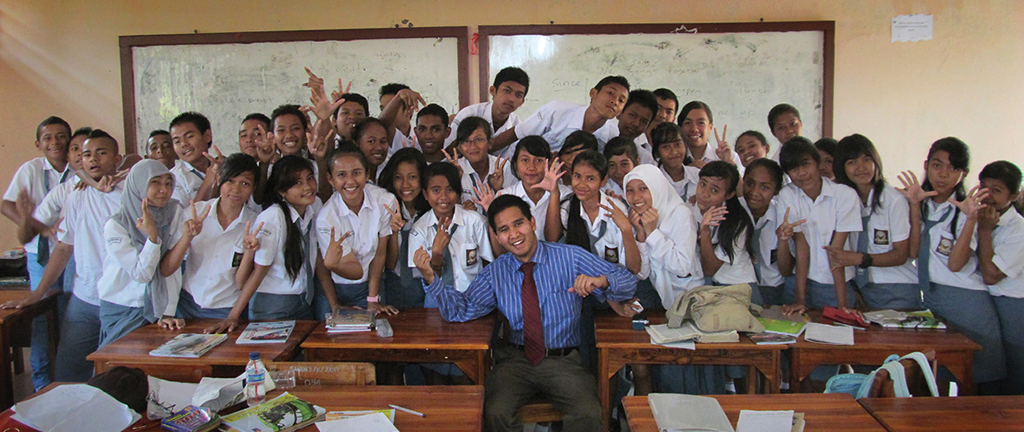
Baylor takes pride in announcing when students earn prestigious awards, such as Fulbright, Truman, Goldwater and many others. To support students seeking such highly competitive awards, the University created the Office of National and International Scholarships. Going through the application process helps students gain a greater understanding of themselves as they refine and define their dreams and goals. And, the ones who successfully obtain an award find the experiences can be life-changing. Baylor Magazine asked a few recent Fulbright recipients to describe how those scholarships opened doors and made impressions on their worldview. Here are their responses.
A Passion to Empower
Ross Daniel Natividad, BA '10, MA '12
International Studies and Spanish
Fulbright Scholar 2012-2013
English Teaching Assistant
Every day was an adventure as a Fulbright English Teaching Assistant (ETA) in West Timor, Indonesia. From tasting the notoriously spicy foods of Timorese cuisine, talking with my neighbors in the local bahasa (language) into the small hours of the night, island-hopping and motorbiking, to teaching in underfunded yet overcrowded schools, my experiences in Indonesia served as a turning point in my life and I am continually inspired by those 10 unforgettable months.
One of my responsibilities as a Fulbright ETA was to teach English classes at Sekolah Menengah Atas Negeri Kupang 3, located on the island of West Timor. I took a bemo every morning at 6 a.m. to get to my school, which was about an hour away. Bemos are compact, mini-buses that play an array of Indonesian, Korean and American pop music to attract and entertain the early-morning commuters. When I arrived at my school, I would get ready for the morning ceremony. In parade-like fashion, the students line up according to grade, sing the national anthem, receive the daily announcements and then listen to a speech from the principal. At the conclusion of the daily ceremony, I could finally begin teaching.
My teaching counterpart and I were in charge of all the 10th grade English classes; we taught 10 classes totaling up to 400 students. Because of the limited resources allotted to public education, teachers were scarce; however, I gradually learned how to become more resourceful and creative with my instructional methods. Although intimidating at times, I appreciated the daily challenges of my teaching schedule and tried to develop exciting activities so that my students could both learn and enjoy the material.
For example, after giving a lecture about "narrative texts," I divided my students into groups and let them compose and dramatize their own narratives. One group creatively adapted the stories of Snow White, Cinderella and Little Red Riding Hood into one impressive play. Another group presented a modern-day, Indonesian version of West Side Story; their rendition of the rumble at the gym was an Oscar-caliber performance. I was so proud of my students. Despite the lack of educational resources and stable electricity at the school, they were self-motivated to learn and always found ways to actively engage themselves with their lessons.
My experience in Indonesia matured my perspective on how others abroad living in dire situations struggle for opportunities to come to the United States. In addition to teaching English classes, I coordinated scholarship workshops for students interested in studying at American high schools and universities. My students viewed this opportunity as more than just a chance to travel abroad; it was a means to personal and economic empowerment that was difficult to find living in one of Indonesia’s most impoverished provinces. As a result of her hard work, faith and dedication, one of my students was awarded a scholarship to study at a nationally acclaimed high school in Virginia. She has become a source of inspiration not only for her classmates back in Indonesia, but for me, as well.
Upon returning home, I became motivated to attend law school and wanted to learn more about the immigration and naturalization processes. I am a second-year student at William & Mary Law School, aspiring to gain the legal knowledge and skills that will allow me to provide first-rate representation to people seeking to achieve the American Dream. I will be working this summer at an immigration court in Baltimore where I look forward to learning more about the intricacies of immigration law and, most importantly, following my passion to empower the underprivileged.
Inspirational Impressions
Jaclyn Hyland, BA '09
International Studies and Journalism
Fulbright Binational Award 2012-13
After living and working in Panama for two years following my graduation from Baylor, I decided it was time for new intellectual and professional challenges.
Fascinated by economic development, emerging markets and entrepreneurship, I wanted to throw myself into a Latin American country where venture capital and early stage investment ecosystem was beginning to flourish. That country was our neighbor, Mexico.
The Binational Business Fulbright program was the perfect combination of valuable professional experience and academic rigor. This program is unique as you work full time for a local company and take business master courses part-time.
My focus during the Fulbright was early stage investing and understanding entrepreneurship in Latin America. I was placed as a project analyst with Angel Ventures Mexico, Mexico's first angel investor network.
During my time there, I reviewed hundreds of early stage companies looking for funding and prepared investment committee documents, helping prepare entrepreneurs for their pitches in front of the Angel Investor club. I was integrally involved in the strategy and support projects on the team. Because of my previous experience starting and running a mentor network for entrepreneurs in Panama, my manager at Angel Ventures let me take the reins on a variety of ecosystem building projects, such as developing a university network of entrepreneurship clubs with the Secretary of Economy and other impact investors and developing entrepreneurship curriculum for high school students with the Secretary of Education and Ashoka Mexico.
I was also able to participate in a variety of sector events as a mentor at Startup Weekend and was chosen as a fellow for the MIT Global Startup Workshop. I came to Mexico with a hunger to learn, experience and do. The Fulbright was the runway to takeoff and successfully achieving my goals and ambitions.
Having grown up in Houston, Texas, living in Mexico didn't feel so far from home; however, I was still completely blown away by Mexico's extreme friendliness, amazing food and people-centric culture. Even in a city of 23 million people, I made unique and meaningful relationships almost daily. With a recently elected president at the time I arrived for the Fulbright, one could feel the energy and lingering suspicion around a package of governmental and economic reforms. Everywhere I walked, I felt surrounded by thousands of people, cars and bustling bikes. It was a beautiful, chaotic, urban city. It wasn't only Mexico City that impressed me. I had a goal of visiting 16 of the 32 states in Mexico, and I did. From Tijuana to Guanajuato to Mérida, I was always amazed by the beauty of the country and the diversity of each state.
Inspiration permeated my Fulbright experience, and I decided to stay another year working for a private equity fund in Mexico City to continue to understand the intricacies of private capital, investment and urban development. My fellow BBers (as we call each other in the business program) are still some of my close friends today, and in my current job as senior investment analyst at Accion Venture Lab in Washington, D.C., when I speak Spanish, my chilango accent gives away how much Mexico really left a lifelong impression.
Challenging Expectations
Randall Fowler, BA '12
Communication Specialist and Religion,
Fulbright Scholar, 2013-14,
English Teaching Assistant,
MA Communication, Baylor
"Keef al-hal? Min zamaan ma shuftak!" shouted my Arabic-speaking students, asking how I was and how my week had been. "La! Engleezee bas hon," I retorted, asking questions in English using vocabulary from last week's lesson.
In many ways, this classroom was similar to those at my primary assignment as an English instructor at Jordan Applied University: a dusty chalkboard at the front, fluorescent lighting overhead, a framed picture of King Abdullah on the wall, and the distant sound of the azaan (the call to prayer) were all active elements in our educational environment. However, this class was unmistakably different in one crucial way. It was comprised not of Jordanian college students, but refugees.
When I first applied to go to Jordan through the U.S. Student Fulbright program the previous fall, I did so not knowing what exactly to expect. Many of my most formative cross-cultural experiences growing up were made on youth group mission trips to Mexico, and in college I was blessed to spend time in both Israel and East Africa serving with Christian organizations. Intrigued by this exposure, I spent much of my time at Baylor studying the history of the Middle East and learning Arabic. Upon landing in Jordan, what I had read about in textbooks and seen videos of on YouTube became real life--and completely challenged my expectations.
As I learned more about the wonderful nation I now called home, one thing stood out that I could not avoid--the refugee crisis. Jordan is not a large country. It has a population of about 7 million people, roughly half of which live in or around the capital of Amman. However, fully 3 million to 4 million of its residents are descended from Palestinians who fled in the wars of 1948 and 1967. There are also an estimated 1 million Syrians currently in Jordan as well, in addition to nearly half a million Iraqis and smatterings of Sudanese, Somali and even Lebanese refugees. Many have lost all they had, including family, fleeing for their lives.
Yet, virtually all the refugees I met weren't bitter or angry, but they were thankful for their deliverance. Many of them, like my English language students at the Jesuit Refugee Center where I volunteered, became close friends. In meeting them, I was reminded of the words of Scripture:
And you are to love those who are foreigners, for you yourselves were foreigners in Egypt. [Deuteronomy 10:19, NIV]
The LORD is a refuge for the oppressed, a stronghold in times of trouble. [Psalm 9:9, NIV]
Religion that is pure and undefiled before God, the Father, is this: to visit orphans and widows in their affliction. [James 1:27, ESV]
While I had all sorts of incredible experiences in Jordan--camping with Bedouins in the desert canyon of Wadi Rum, hiking the trails of Wadi Musa, floating (involuntarily) in the Dead Sea, breaking iftar during Ramadan, the friends I made from all parts of the globe, watching the World Cup in downtown Amman, discovering my passion for teaching, and exploring the innumerable Roman ruins scattered across the country, to name a few--all these adventures pale in comparison to the impact of befriending, serving and knowing the refugees of Jordan.
Whether teaching English classes, delivering food to hungry families through my local church, or simply playing soccer games and singing with Syrian children, I was greatly enriched by my time with "the least of these."
Put simply, Jordan was life-changing. The beauty of the Arabic language and my interest in the region grew stronger by living there. I am now in graduate school studying foreign policy rhetoric to learn more about how we can build bridges of understanding between our regions, religions and cultures. More importantly, my time there taught me that Jesus truly does love all the little children--and big adults, for that matter--of the world.
Baylor is a special place for me because my time as a student not only prepared me to engage Jordanian culture intellectually, but enabled me spiritually to invest and thrive in it as well. Whether I'm abroad in Arabia or home in Texas, I now know even more deeply what it means to fling afar the green and gold: serving others in the name of Christ.
Gaining New Perspectives
Brent Salter, BA '13
International Studies and Journalism
Fulbright Scholar 2013-14,
English Teaching Assistant
As a child, I sometimes fell asleep before making it to my bed. One of my parents would gently lift me from the car seat or couch where I slept and take me to my room. The next morning, I would awake and wonder, "Where am I? How did I get here?"
I asked these same questions on a daily basis during my time in Eastern Europe. Although I had traveled widely and lived abroad before, spending a year as a Fulbright English Teaching Assistant in Moldova afforded opportunities for experience, observation and reflection unlike any previously, and there were surprises of every kind along the way.
The thunderous sound of students rising to their feet when I entered a classroom. The cup of tea and sweets offered each time I sat down. The stares of children when I spoke in English. The rickety buses and Soviet-era cars that filled the streets. The Orthodox priest who would sling holy water on people going about their lives, even as they got haircuts. These things amazed me as an inaudible question formed on my lips, "How did this become my life?"
I knew the technical answer, of course. Having spent months investing time and thought into my application, choosing Moldova wasn't a rash decision. Several previous visits to the country had left me impressed by the hospitality and intelligence of the people, not to mention the beautiful landscapes and good food. Along with my academic interests in Eastern Europe, these were reasons the country stood out when I considered where to spend a year teaching.
But as my days in Moldova turned to weeks, understanding why I was there eluded me. Yes, I had the honor of teaching at a university and representing the U.S., but wasn't there also a greater purpose? I began a quest to answer this question, even as uncertainty grew around me.
I awoke one night to everything shaking. An earthquake rattled my apartment on the seventh floor of a Soviet building, and palpable tension fell over the city below. It foreshadowed the friction between Russia and the West that was soon to come. As the conflict in Ukraine rapidly escalated and Crimea was annexed, Western media posited Moldova might be the next target. Messages from friends and family asked if I was in danger. The embassy told us to be ready in case things took a turn for the worse. I wondered if this would be how my Fulbright experience ended.
Each day I stood at the front of the classroom before students who eyed me skeptically, if not suspiciously. To some who supported Russia, I was the bad guy. To some who only knew the 90210 America shown on TV, I was the entitled trust-fund kid who would never understand hardship they had lived. To some weary of outsiders coming to make changes in Moldova, I was the naïve American with a pre-packaged solution in-hand for every problem.
I understood their feelings, because I once held misconceptions about people outside my country, too. This was especially true when I came to Baylor, but classes like World Cultures, The World of Rhetoric, Comparative Politics and Model U.N. served as steppingstones across swirling rapids of misunderstanding. In the same ways my professors at Baylor carefully and thoughtfully challenged myths and imparted wisdom that I will remember for my lifetime, I was inspired to show my students new perspectives.
It was difficult to gauge what the students learned or took to heart--whether they crossed the steppingstones or merely stood at the river's edge. There were undeniable "ah ha!" moments during class discussions that gave me hope a difference had been made. Then, the week before I returned to the U.S., I received a note from a stoic student: "I never thought that Americans are so interesting and intelligent people with a great sense of humor. You have changed my view about America and Americans."
For such a time as this--of conflict, hardship and confusion--I had been placed in Moldova to share the lessons and wisdom others gave me. This was my purpose. And although, like a child moved while asleep, I sometimes wondered, "How did I get here?," I realized I was providentially brought to the place I was meant to be by someone who was taking care of me.
Salter is currently in graduate school at the London School of Economics and Political Science.
Defining Moments
Huong Nguyen, BA '12,
Medical Humanities Fulbright Postgraduate Scholar, 2012-13,
MS, Health Sciences and Public Health Research,
University of Aberdeen in Aberdeen, Scotland
Everyone wants to be able to say they did something ridiculous in their 20s. With that being said, I moved to Scotland three months after I graduated from Baylor. Although that might sound crazy, my family and friends will tell you that me moving halfway across the world was nothing out of the ordinary. My crazy life includes a journey filled with extraordinary opportunities to the United Kingdom granted by the Fulbright Program.
I never saw myself packing up my entire life and moving away from everything I knew at age 22. Quite honestly, I don't think I ever really thought I would have the opportunity, or courage, to do just that. But when Fulbright offered me a fully funded grant to study, research and live in the U.K., nothing could have stopped me.
My first week was in London, where I met and became fast friends with the 30 other postgraduate scholars who would be based all over the U.K.--England, Scotland, Wales and Northern Ireland. From there, I made my journey north to Aberdeen, Scotland. It was the most terrifying and edifying moment of my life. Being completely alone without any sort of lifeline to anything or anyone familiar was frightening, but so good for me.
At the beginning I felt like I was being pushed past my breaking point. With a little bit of valour and a lot of faith, I found a way to plug myself into a group of friends who helped me find my way and made Scotland home just as much as Texas is home. I was able to make friends from all over the U.K. and Europe. I met the honorable Louis B. Susman, who was the American ambassador to the U.K., was given a personal tour of St. Andrews by the golf curator at the Old Course (and stood on the 18th hole), and explored countless castles (a dream of mine since I was a little girl). The list could go on and on.
My year in Scotland transformed me. Although not understanding subtle cultural differences was initially frustrating, it ultimately taught me to appreciate and love people regardless of differing convictions and lifestyles. Conversations about opposing issues and beliefs with my British and European friends gave me a new appreciation for people in general. It allowed me to connect with my supervisor, a British physician who was largely vested in the improvement of the National Health Service in Scotland, for my research project. I joined the Chronic Disease Group as a graduate research student and conducted a retrospective cohort study to show the correlation of moderate chronic kidney disease and hip fractures. I know it sounds boring, but talking about the differences between the British and American healthcare systems with her and using the NHS when I got sick while concurrently learning about changes in several healthcare systems in my graduate courses offered me a perspective of medicine on a global scale. These experiences gave me a passion that is the relentless driving force behind my continuing quest into healthcare. I plan on being a family physician.
Winning a Fulbright to the United Kingdom is one of the highlights of my life. I believe I left a piece of my heart in Scotland. The friends that I made have become some of the most important people in my life through shared experiences and mutual love and respect for one another. In fact, I traveled to Portugal in March to spend some time with a friend that I made while in Scotland, and then reunited with many friends at a "Fulbright wedding," the first of many weddings from my cohort of American scholars to the United Kingdom. The best moments in our lives become the best memories that we have. Knowing that many of these moments are memories that I get to share with friends who I have come to love most makes me incredibly happy.
